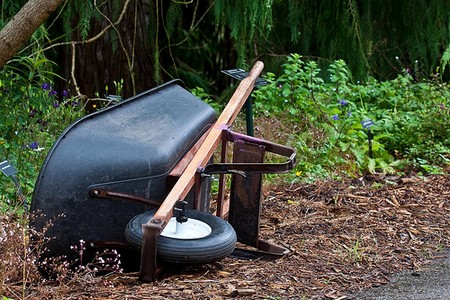Paths
Make sure the garden path is in good condition with no loose or uneven stones on which people could trip. Your steps should be safe too. Always sweep leaves and moss from steps and paths or they become very slippery. If the access to your house is along a path or up or down steps, make sure it is well lit. If your house is set well back from the road, lay your front path with a noisy, crunchy substance like gravel, so that you can hear anyone coming down it.
Boundaries
Always check fences to see that there are no protruding nails or splinters. If your garden is on a main road, think about growing a thick hedge to protect your family from breathing in too many toxic exhaust fumes. Fit a child-proof catch to the garden gate and mend any holes in your fence or hedge.

Water
Ponds should be covered or enclosed if you have small children. A child can drown in 2 in (5 cm) of water. If your garden is on a river or stream, fence it off for the same reason. Do not leave buckets of water lying around either. Always supervise a child’s water play, even in a paddling pool. If children cannot step out of a paddling pool on their own, they are too young to use it.
Animals
If possible, pet bowls should be kept outside. If they must be indoors, keep them out of a child’s way.
Although compost heaps are excellent as they get rid of your organic waste and feed your garden with valuable nutrients, rotting animal matter and bones should not be put on as they may attract unwanted animals.
Keep sandpits covered when not in use as they become an attractive toilet for stray cats. Make sure children never play with the excrement of cats or dogs. Both cat and dog faeces can spread many diseases, the most harmful of which is toxocara which can affect the brain, the lungs and the eyes.
Fire
Never light a bonfire or barbecue using petrol or paraffin and supervise all fires carefully, especially with children about. A fire can easily get out of control and set light to an overhanging tree in your neighbour’s garden, if not your own – keep a hose or a bucket of water handy. Do not choose a windy day to light a bonfire and keep it well away from your house. Do not burn household rubbish such as rubber, foam or ceiling tiles which can give off toxic gases. Extinguish bonfires at night. You may consider having dry chemical extinguishers on hand for safety purposes.
Tools
Always keep gardening equipment in good condition and put tools away after use. Keep them locked in a shed that is accessible to children. Ideally, install special exterior sockets and use a residual current circuit breaker.

Never let a child push or drive a lawnmower or play near a lawnmower in use. Always keep the electric cable over your shoulder and away from the blade when using power hedge-trimmers or a lawnmower – use a brightly-coloured cable to avoid mowing over it. Never use electric lawn-mowers when it is raining or when the grass is wet and do not leave them or any other electrical equipment out in the rain. Never pull an electric lawnmower towards you and never pick it up when it is on. Do not leave any mower unattended when the motor is running.
Garden furniture
In the spring check garden swings, climbing frames, deckchairs and other garden furniture to see if fittings have corroded or rotted during the winter months. Supervise younger children, especially when several are playing together. Make sure swings hanging from branches will hold your weight; if they do not, they probably are not safe for your child to use either.